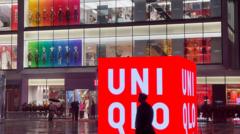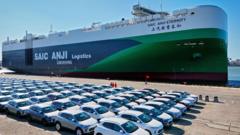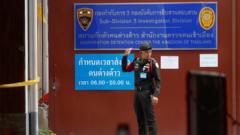Uniqlo's CEO, in a bid for transparency, declares that the brand does not source cotton from Xinjiang after enduring pressure from both U.S. and Chinese markets.
Uniqlo CEO Clarifies Stance on Xinjiang Cotton Amid Global Scrutiny

Uniqlo CEO Clarifies Stance on Xinjiang Cotton Amid Global Scrutiny
Tadashi Yanai emphasizes company’s non-use of Xinjiang cotton in BBC interview, addressing forced labor concerns.
In a groundbreaking statement to the BBC, Tadashi Yanai, the chief executive of Fast Retailing, the parent company of Uniqlo, has confirmed that the popular fashion retailer does not utilize cotton sourced from the Xinjiang region of China. This revelation marks the first time Yanai has openly addressed the sensitive issue, which has become increasingly fraught with controversy due to reported forced labor practices involving the Muslim Uyghur minority in the area.
The Chinese market has proved vital for Uniqlo, not only as a consumer base but also as a significant manufacturing locale. Xinjiang cotton, historically celebrated for its quality, has seen a decline in global acceptance following allegations of human rights violations in its production process. Legislative measures from the United States have implemented stringent regulations against imported goods from Xinjiang, prompting numerous global brands, including H&M and Nike, to remove such products from their collections. These moves sparked considerable backlash within China, leading to boycotts and lost business opportunities.
Previously, Yanai refrained from confirming whether Uniqlo made use of Xinjiang cotton due to his desire to maintain a neutral position amid escalating tensions between the U.S. and China. This strategic ambiguity had allowed Uniqlo to retain its popularity in China's robust retail landscape. However, in the latest interview, Yanai stated, “We’re not using [cotton from Xinjiang],” though he also cautioned against delving deeper into the subject, saying it veered into political territory.
Analyst Isaac Stone Fish remarked on the shifting expectations for large corporations, asserting that neutrality is no longer a sustainable approach as both American and Chinese authorities demand allegiance from companies operating in their markets. Despite Uniqlo’s significant global presence and aggressive expansion in Europe and North America, Yanai reaffirmed that China remains the cornerstone of his business strategy, with aspirations to triple the number of stores in the country.
Additionally, Yanai acknowledged Uniqlo’s ongoing reliance on China as its primary manufacturing hub while recognizing challenges in replicating this success in other low-wage countries. The retailer faces increasing competition from ultra-fast fashion brands such as Shein and Temu, yet Yanai remains committed to sustainability, dismissing the fast fashion model as wasteful and unsustainable.
Having transformed a modest annual revenue of approximately 100 million yen into a global powerhouse with nearly 3 trillion yen in sales this year, Yanai has ambitious goals for Uniqlo, aspiring to surpass Inditex, the parent company of Zara, as the world's leading fashion retailer before his retirement, all while navigating the shifting political landscape that may pose new challenges ahead, particularly with the potential return of Donald Trump to the presidency, threatening higher tariffs on Chinese imports.
The Chinese market has proved vital for Uniqlo, not only as a consumer base but also as a significant manufacturing locale. Xinjiang cotton, historically celebrated for its quality, has seen a decline in global acceptance following allegations of human rights violations in its production process. Legislative measures from the United States have implemented stringent regulations against imported goods from Xinjiang, prompting numerous global brands, including H&M and Nike, to remove such products from their collections. These moves sparked considerable backlash within China, leading to boycotts and lost business opportunities.
Previously, Yanai refrained from confirming whether Uniqlo made use of Xinjiang cotton due to his desire to maintain a neutral position amid escalating tensions between the U.S. and China. This strategic ambiguity had allowed Uniqlo to retain its popularity in China's robust retail landscape. However, in the latest interview, Yanai stated, “We’re not using [cotton from Xinjiang],” though he also cautioned against delving deeper into the subject, saying it veered into political territory.
Analyst Isaac Stone Fish remarked on the shifting expectations for large corporations, asserting that neutrality is no longer a sustainable approach as both American and Chinese authorities demand allegiance from companies operating in their markets. Despite Uniqlo’s significant global presence and aggressive expansion in Europe and North America, Yanai reaffirmed that China remains the cornerstone of his business strategy, with aspirations to triple the number of stores in the country.
Additionally, Yanai acknowledged Uniqlo’s ongoing reliance on China as its primary manufacturing hub while recognizing challenges in replicating this success in other low-wage countries. The retailer faces increasing competition from ultra-fast fashion brands such as Shein and Temu, yet Yanai remains committed to sustainability, dismissing the fast fashion model as wasteful and unsustainable.
Having transformed a modest annual revenue of approximately 100 million yen into a global powerhouse with nearly 3 trillion yen in sales this year, Yanai has ambitious goals for Uniqlo, aspiring to surpass Inditex, the parent company of Zara, as the world's leading fashion retailer before his retirement, all while navigating the shifting political landscape that may pose new challenges ahead, particularly with the potential return of Donald Trump to the presidency, threatening higher tariffs on Chinese imports.




















